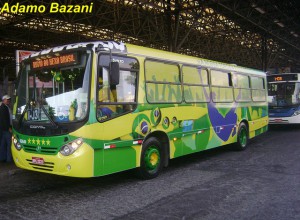Public transport in Brazil Posted by Ester on Jun 8, 2015 in Culture, Customs, Learning, Vocabulary
Getting the ônibus (bus) or any other transporte público (public transport) in a different country can be quite estressante (stressful). This is why it could be handy knowing the culture as well as vocabulary related to it.
Useful information and cultural aspects:
- There are websites for different cities where it is possible to check the mapa, rota e horário (map, route and timetable) for each ônibus. A quick google search will do, for example “ônibus Rio de Janeiro”.
- You have to signal for the ônibus to stop and when it does you will get on it through the front door.
- Pay the passagem (fare) using money or swiping your public transport card if you have one. Only then will they allow you to go through the roleta (turnstile).
- If the ônibus is packed with people you might not be able to go through the roleta/catraca, but it is important to try and make your way to as further back on the bus as possible.
- In case you have to get off soon and the bus is full, try to make your way to the back door saying “licença, por favor” (excuse me, please) to people who are in your way. Sometimes you might have to push through the crowd, which is absolutely fine as long as you are polite, even though some people aren’t.
- It is common in some cities for people to offer to carry your backpack or bag if you are standing and they’re not. It is up to you to say yes or no. Saying “não, obrigado” is not rude.
- In some cities it is OK to ask people if they want you to carry their bag. But because it is not common everywhere in Brasil it is important to find out if it is part of the culture in that specific area.
- Ônibus (buses) can have two, three or four digit numbers and some have letters at the beginning or the end. So it would be something like: 50, 901, 8102, 72B, 4403A.
Vocabulary
- Quanto é a passagem? / Quanto custa a passage? – How much is the fare?
The word passagem can be used for different means of transportation and it translates as fare or ticket.
- passagem de ônibus – bus fare or ticket
- passagem de trem/metrô – train fare or ticket
- passagem de avião – plane ticket
- Trocador/trocadora – the person who sits at the turnstile on the bus, to whom you pay the fare.
- Desculpa, eu não tenho trocado – I’m sorry I don’t have change.
When you use a R$20 or a R$50 note to pay for your passagem, it is polite to apologize for not having a smaller note.
- Esse ônibus vai ao Shopping Rio Sul? – Does this bus go to Shopping Rio Sul?
Esse ônibus passa na rua Cardeal Mota? – Does this bus go on rua Cardeal Mota?
- Você pode me avisar quando estiver chegando no Shopping Rio Sul? – Could you let me know when we’re approching Shopping Rio Sul?
Sometimes when you don’t know where to the off, you can ask the trocador/trocadora to let you know. If you do so make sure you sit or stand where they can see you.
- Com licença, por favor – Excuse me, please.
Use it when you need to make your way through the crowd on a busy bus. It is also common to say only “licença”.
- Quer que eu leve sua bolsa/sacola/mochila? – Would you like me to take your bag/backpack?
- Não precisa, obrigado. – No, thank you.
- Sim, obrigado. – Yes, please.

Build vocabulary, practice pronunciation, and more with Transparent Language Online. Available anytime, anywhere, on any device.





Comments:
Javi:
Public transport in Brazil is a joke. Bus drivers are dangerous. Roads are full of potholes and bumps. Infrastructure needs a big improvement if Brazil wants to be a world power. This is the opinion of some who has lived in Europe (Spain, Portugal, France, Uk and Switzerland) , South Africa and South America (a set of cointries where street violence and security are big issues)
P.D: I love Brazil and Brazilians. My criticism is a constructive one, or I want yo think so. I think since this is a portuguese blog, you should talk about other coubtries besides Brazil, especially Portugal. Greetings
Joe:
I disagree with javi. This post was very useful and reminded me of when i visited Brazil. I’m not interested in learning European Portuguese yet & enjoy learning new Brazilian Portuguese expressions.